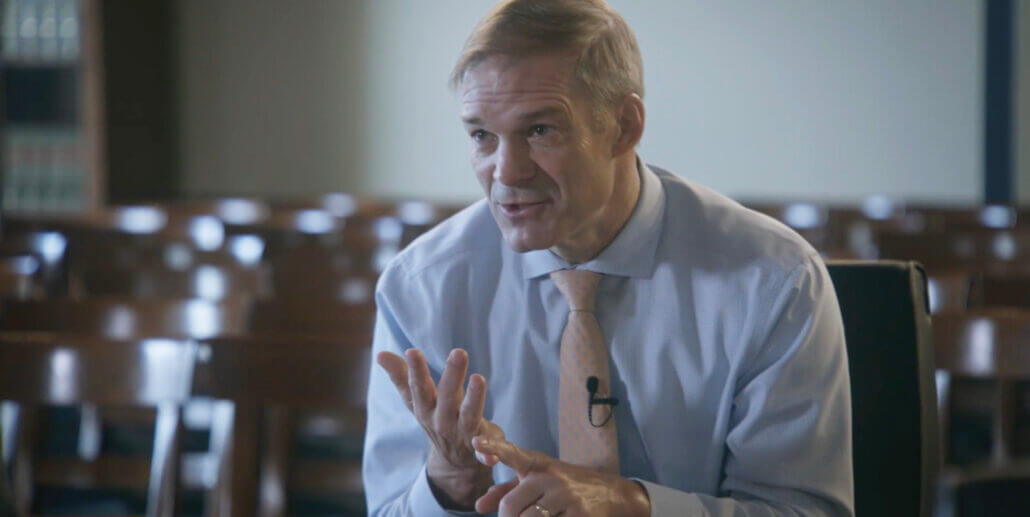American Greatness sat down with filmmaker Dinesh D’Souza for an exclusive interview about his latest film, Police State, which opens in theaters October 23 and 25. Find showings in your area at PoliceStateFilm.com.
Read Part 1 and 2 of this series here and here.

AG: In the film, you detail how, whether it’s the “War on Islamic Terrorists” or the “War on COVID” or “War on Disinformation” or “War on Domestic Terrorists”, there’s sort of a plug-and-play model for the police state to continually redefine their targets under the umbrella of “terror.” What do you see as the next target in this plug-and-play model?
DD: Well, there are some things that we can predict that are common to all police states that are under construction. One of them is the routine, and the insistent use of, the politics of fear.
I think historically, the Democrats discovered the political merits of fear in the 1930s, during the Great Depression. There was a lot of genuine fear and the Democrats realized that looking back. We got a lot of our welfare state programs because people were so scared.
People were willing to do new things that they wouldn’t otherwise have been willing to do – had they not been in dire straits, had the banks not closed, had they not lost their savings in the stock market.
Fear propels people into a submission that they otherwise might be reluctant to do.
Now, we didn’t have a police state under FDR. The Democrats then were different than the Democrats now.
I believe that the party became “gangsterized” initially under Obama, who tried some police state tactics. One of them was going after me. But, nevertheless, when he did that, I thought that was a one off. I thought, listen, I made a film. I upset this vindictive narcissist in the White House. He got a little humiliated, so he told Eric Holder to go get me.
And so I didn’t see my case, and this is my own naivete, as a prelude and a precursor to what would happen later to Carter Page, George Papadopoulos, Michael Flynn, and obviously now Trump himself.
So under Biden, we have seen a ramping up, an escalation, of the police state to a degree and rapidity of which has taken me and probably many others by surprise.
AG: Do you think Biden even knows what’s going on? Do you think he’s actually a part of it?
DD: Someone’s doing it for him, but this does not mean that he is an innocent bumbler.
He’s a little bit like the crusty, old mafia boss who is now mumblingly (sic) incoherent and perhaps, you know, flashes in and out of consciousness and is not entirely sure what he’s saying.
But still he’s a bad guy.
He’s part of a malevolent operation and he is a willing participant in that operation. So merely to point out that, you know, Biden’s not steering the canoe, I think, lets him off too easily.
It is true that one of the unique characteristics of our police state and one of our sources, Darren Beattie makes this point in the movie, is that with other police states, you almost inevitably know who’s running it.
It’s Kim Jong Un, or it’s Castro, or it’s the Supreme Mullah Khamenei, or it is Xi in China. But with our police state, we do not know who is in charge. And that’s, in some ways, a little chilling because somebody’s running the country. Is it Obama? Is it the people around Obama who are now surrounding Biden?
It is a peculiar feeling to live in a democracy where we have elected leaders and yet there’s another gang, unidentified, that is running the show.

AG: You look at the attack on civil liberties in the wake of “COVID”, or you look at the public fervor after 9 11 and support for the Patriot Act, and you see that a sector of the public often cheerfully and willingly gives up their liberties. How does the police state either fuel that, or take advantage of it?
DD: I think the communists have always understood that all of these police state operations must be run by a small, ruthless, and dedicated minority, and the truth is, they always have been run that way.
Lenin had a relatively small cadre of highly dedicated, ruthless Bolsheviks, and they were able to grab a hold of the country. Now, once they grab a hold of the country, there’s a lot that they can do to mobilize otherwise “merely operational” elements of the government on their behalf.
I think something similar happens in our country now with agencies like the Department of Homeland Security and the FBI.
The ordinary DHS or FBI agent is not a scary guy. He’s a normal guy, or she’s a normal woman. They have a family, and they drive a car, and they’ve got three bedrooms at home, and they go see a movie on Sunday, or on Saturday.
So how do you get — this is one of the mysteries that the movie tries to wrestle with — how do you get a good guy to do something so horrific?
How to you get that person to kick in the door of a 68 year old grandmother, seize her by the hair, pull her to the ground, twist her arms behind her back and put her in handcuffs, pull her by the feet down the stairs, bouncing into the street where her neighbors will come and gawk and gloat at her?
How do you do something so barbaric that you would think of as a police state tactic?
Well, the answer is that the government bureaucratizes the whole process and makes you just one cog in that wheel. You don’t have to decide who the person is, what they do, whether it’s right or wrong. You have an operational task and that is to make an arrest.
And they tell you that for this arrest to be safe, you have to surprise the person you’re arresting. You can’t go in the middle of the day and knock on their door. They could come to the door with a gun. You’ve got to kick in their door at six in the morning and you go, Oh yeah, that’s right. We have to do this for the person’s own safety.
So what I’m getting at here is this. I saw an interesting news report about the FBI hostage negotiator, basically an assassin, who was brought in to Waco, in a sense, to take out David Koresh because David Koresh was in the building. And they were interviewing this guy and they asked him, they said, you know, do you know who David Koresh is?
And he goes, well, not really. And they go, do you know what he did? And he goes, not really. And they go, and yet you’re willing to show up with a long rifle, put him in your sights, and take him out. And the guy goes, yeah. And he goes, look, I’m the guy that they call in when all the negotiations fail.
And they just point and go, there’s a bad guy. You take him out. And this guy views his job purely in operational terms. It’s not to decide guilt or innocence. It’s not to make any moral judgment. There’s a bad guy. And the way that this guy protects truth, justice, and the American Way is he lines up a very careful sniper shot and takes that guy out.
So this is how you get a good guy with a family, a guy with a military background who happens to be a really good shot, to become an unwitting arm of the police.
AG: That response ties into the scene in the movie in which you interview Joseph Bolanos, a man who was at the U.S. Capitol on January 6, but didn’t even enter the Capitol building. And yet, after a bystander overheard Bolanos talking about the Capitol rally, federal agents descended upon his home, ransacked it, and took him into custody at gunpoint. In tears, Bolanos tells you that in 1930’s Germany, it wasn’t just government thugs that did the damage, it was peoples’ neighbors that did the snooping and the ratting on each other.
DD: So this gets to one of the most profound insights in Solzhenitsyn’s Gulag Archipelago, in which he says that it comes with some shock for a person who has carefully thought about good and evil and also about freedom and tyranny to realize that the line separating good and evil and the line separating freedom and tyranny runs through every human heart.
Now, this is quite a thing for Solzhenitsyn to say, a guy who served eight years in the Gulag. It’’s very easy for him to say “we’re the victims and therefore the good guys. I made a casual remark about Stalin that got me here. He’s the evil guy.”
But Solzhenitsyn recognizes that this tyrannical impulse is in all of us.
So what police states are able to do is tap into that. They’re able to draw out, if you will, the worst side of human beings; the side that wants to see your neighbor dragged and humiliated so that you can feel that you’re better than that person.
Or you can feel that you’re on the side of virtue because you called him in; you reprimanded him, even though the crime itself is not a real crime, it’s an ideological crime.
These are the recognized hallmarks of police states. It’s interesting that we’ve been through the horrid history of the 20th century, where some 100 million people found themselves decimated by police states of one kind or another, from Pol Pot to Castro to, of course, the successive rulers of the Soviet Empire, and yet we have so quickly forgotten all those lessons and don’t recognize those tendencies when they show up right here in our own society.
This is why a film like this, which I never really wanted to make, becomes very urgent and becomes very much needed.
In Part 4 of our Q&A with Dinesh, we discuss Americans who were prosecuted for “January 6th” and why the U.S. Air Marshals might still be following you…
